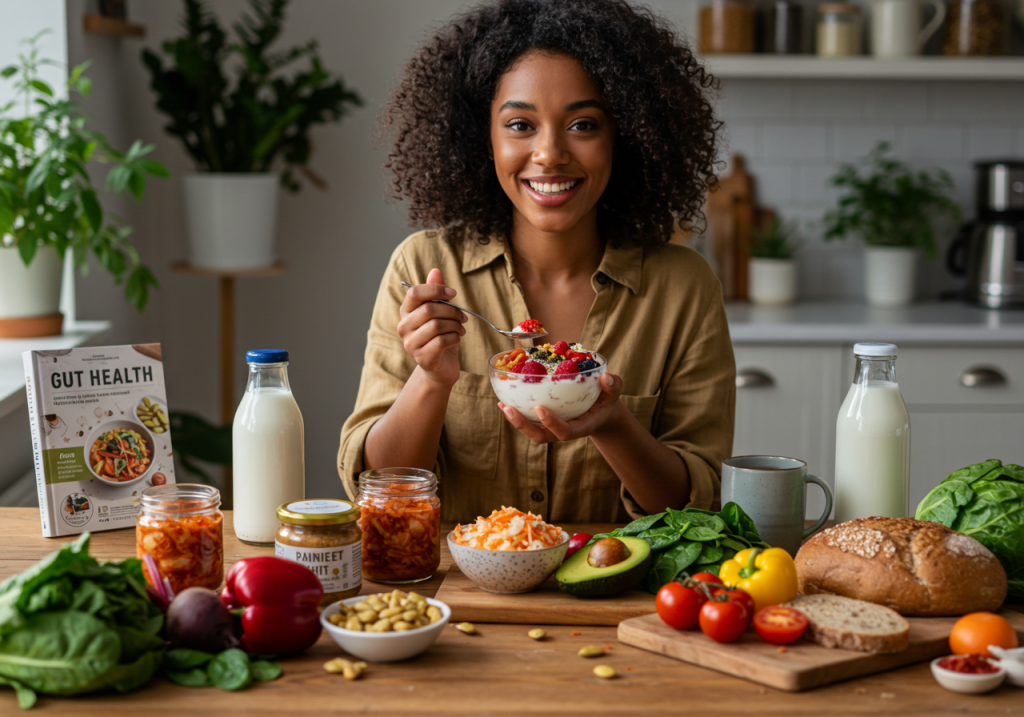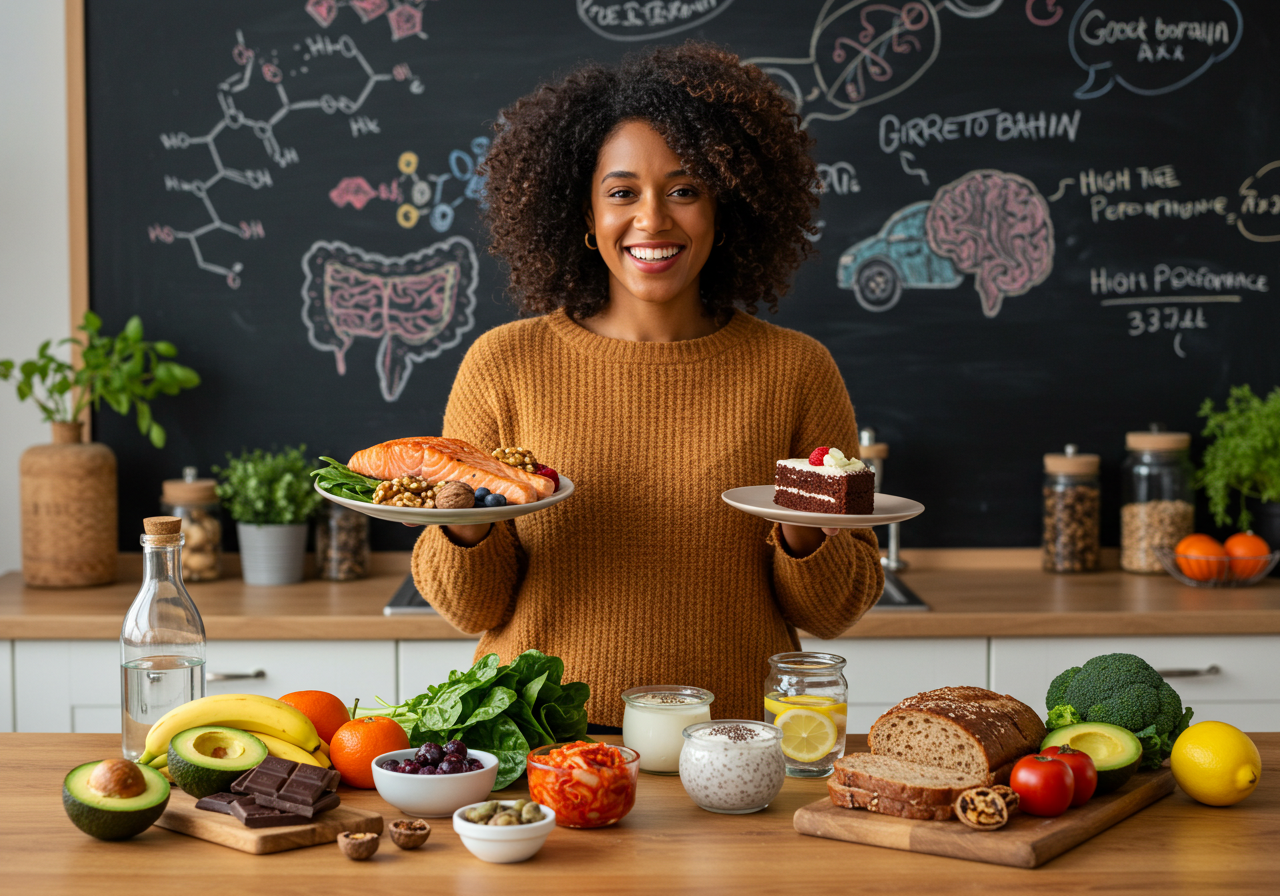What Is the Connection Between Diet and Mood?

Your mood plays a significant role in your daily life, and it could be more closely tied to your diet than you might think. What Is the Connection Between Diet and Mood? is a question that has gained increasing attention in recent years. The food you eat not only affects your physical health but also has a direct impact on your emotional well-being. But how does this work?
Think of your body like a high-performance sports car. Just as you fill that car with premium fuel, your brain needs the right kind of nutrients to run at its best. Healthy, nutrient-dense foods—like fruits, vegetables, and whole grains—help your brain function optimally. These foods are packed with essential vitamins and minerals that support the production of neurotransmitters like serotonin, often referred to as the “feel-good” hormone.
For instance, bananas are rich in tryptophan, which the body converts into serotonin, promoting a positive mood. So, when you ask What Is the Connection Between Diet and Mood?, the answer lies in foods like bananas that help boost serotonin, leading to a happier mindset.
On the flip side, constantly reaching for junk food is like putting low-quality gas in that fancy sports car. Sugary snacks and unhealthy fats don’t provide the brain with the fuel it needs, leading to mood swings and irritability. Have you ever experienced a sugar crash? That’s your brain signaling that it didn’t get the nutrients it needs to keep going strong.
Let’s not overlook hydration either. Dehydration can make you feel sluggish and mentally foggy, almost like trying to drive through a storm with no windshield wipers. On the other hand, staying hydrated keeps your brain running smoothly, improving focus and mood.
In conclusion, a healthy diet isn’t just good for your body; it’s essential for maintaining a positive mood. What Is the Connection Between Diet and Mood? The answer is simple: the food you eat directly influences your brain and emotional state. So, the next time you sit down for a meal, remember that your food choices can be the key to a happier, healthier you!
Feeding Your Mood: How Your Diet Shapes Your Emotional Well-Being
Have you ever woken up feeling a bit off, and thought a bowl of sugary cereal would do the trick to kickstart your day? But then, just moments later, you find yourself crashing, feeling even worse than before. Why does this happen? The answer lies in the nutrients your brain needs to function properly! Your brain thrives on the right foods, and what you choose to fuel it with can have a significant impact on your emotional well-being.

Foods rich in omega-3 fatty acids, like salmon and walnuts, are essential for producing neurotransmitters like serotonin, the “feel-good” hormone. By adding these nutrient-packed foods to your diet, you’re not just nourishing your body—you’re also supporting a positive mood. This is why it’s so important to make mindful food choices that benefit both your physical and emotional health.
Let’s also talk about the magic of colorful fruits and vegetables. These vibrant foods are packed with vitamins and minerals that help alleviate stress and anxiety. Have you heard of the “rainbow diet”? It’s not just a fun concept; it’s a simple reminder to eat a variety of colorful foods. Each color offers unique health benefits, helping your brain regulate emotions more effectively. Filling your plate with a spectrum of colors is like wrapping your mood in a warm hug.
And don’t forget about dark chocolate! This indulgence isn’t just delicious; it can trigger the release of endorphins, the body’s natural “feel-good” chemicals. Think of dark chocolate as a little cheerleader for your brain—boosting your mood and satisfying your sweet tooth at the same time. So, the next time you’re feeling low, consider choosing a piece of dark chocolate over that bag of chips. Your mood—and your taste buds—will thank you!
In conclusion, what you eat has a direct impact on how you feel. By making thoughtful, nutrient-rich food choices, you can improve not only your physical health but also your emotional well-being. So, the next time you reach for a snack, remember: what you feed your body is just as important as what you feed your mind.
From Broccoli to Bliss: The Surprising Link Between Nutrition and Happiness
Have you ever wondered how food can affect your mood? The secret lies in how our bodies respond to the nutrients we consume. Think of your body like a high-performance car; just as it needs the right fuel to run smoothly, your brain also requires proper nutrition to function at its best. By choosing to nourish yourself with leafy greens, whole grains, and fresh fruits, you’re not only providing your body with essential vitamins and minerals, you’re also fueling your brain with happy chemicals!


Let’s also dive into the fascinating world of gut health. Did you know that your gut is often referred to as your “second brain”? It’s responsible for producing nearly 90% of your serotonin, making it a powerful player in regulating your emotions. Taking care of your gut by consuming fermented foods like yogurt, kimchi, and kefir can help improve your mood and boost overall happiness.
When you choose whole, nutrient-dense foods, you’re not just filling your stomach—you’re building a foundation for emotional well-being. Each meal becomes a stepping stone on your journey to happiness. The exciting discovery is that what you eat directly influences how you feel. By making mindful food choices, you can transform everyday eating into an adventure that nurtures your mind, body, and spirit.
In conclusion, there is a direct connection between what you eat and how you feel. By nourishing your body with the right foods, you’re not only improving your physical health but also creating a happier, more balanced life. So the next time you sit down for a meal, remember: you’re not just feeding your body; you’re feeding your mood!
Energize Your Mind: The Impact of Dietary Choices on Mental Health
Have you ever wondered, What Is the Connection Between Diet and Mood? It turns out that the food you eat plays a huge role in shaping your mental well-being. Imagine enjoying a plate of bright, colorful fruits and veggies, each bite packed with vitamins and antioxidants. These nutrient-rich foods not only support your physical health but also act as shields against mental fatigue. If you’ve ever felt sluggish or low on energy, your diet might be to blame. A steady diet of processed foods can leave your brain feeling sluggish, like trying to run a high-performance engine on low-grade gas.
Omega-3 fatty acids—found in foods like fish and flaxseeds—are a prime example of how food impacts mental health. What Is the Connection Between Diet and Mood? Well, these healthy fats significantly boost mood and memory by supporting the production of serotonin and other mood-regulating neurotransmitters. Think of omega-3s as little soldiers marching into your brain, clearing away the clouds of anxiety and depression. With regular intake of these healthy fats, your mind can experience a noticeable lift.
And don’t forget the power of hydration! Water is essential for all your mental processes. Dehydration can cause brain fog, making even the simplest tasks feel overwhelming. So, keep that water bottle close—it’s your trusty sidekick in maintaining mental clarity.
Next time you’re planning your meals or reaching for a snack, consider the impact on your mental health. Choosing nutrient-dense foods can create a ripple effect that sparks joy, creativity, and positivity in your everyday life. So, What Is the Connection Between Diet and Mood? It’s simple: the right foods nourish both your body and mind, helping you perform at your best.
Gut Feelings: Exploring the Gut-Brain Connection and Dietary Influences on Mood
Have you ever wondered how your diet affects your mood? The answer lies in a fascinating connection between your gut and brain. Imagine your gut as a bustling metropolis, teeming with trillions of microbes that influence everything from digestion to your emotions. What Is the Connection Between Diet and Mood? Well, when you choose to nourish your gut with healthy foods, you’re creating a better environment for your brain to thrive.
However, when your diet consists mostly of processed foods, you’re feeding the wrong crowd in your gut, giving bad bacteria the chance to throw a party, while the good bacteria are left out in the cold. This imbalance can lead to mood swings, anxiety, and a general sense of unease. Just like investing in quality infrastructure for a city, fueling your gut with nutritious foods can pave the way for better mental health and emotional well-being.
So, what should you be putting on your plate to foster a healthy gut? Vibrant fruits, leafy greens, and whole grains are like premium real estate for your gut bacteria, creating a nourishing environment that sends positive signals to your brain. Ever wonder why you feel great after a smoothie packed with berries or a hearty salad? That’s your gut sending “thank you” notes for the nutrition you’ve provided.
And let’s not forget about fermented foods, which are mood boosters in disguise! Items like yogurt, kimchi, and kefir are rich in probiotics that can enhance serotonin production, the “happy hormone.” These small dietary changes can have a huge impact on emotional balance. What Is the Connection Between Diet and Mood? It’s simple: by adding nutrient-rich, gut-friendly foods to your diet, you support both your digestive health and mental well-being.
Next time you’re feeling low, consider swapping that bag of chips for a colorful veggie-packed meal or a bowl of tangy yogurt. Your gut—and your brain—will thank you!

Can What You Eat Really Affect How You Feel? Understanding the Diet-Mood Connection
Imagine your brain is like a high-performance car, and food is the fuel. When you fill up with premium ingredients—such as leafy greens, nuts, and omega-3-rich fish—you’re ready to hit the road at full speed. But what happens when you load up on sugary snacks and fast food? Your engine might sputter, leading to crashes in both energy and mood. It’s like trying to run a marathon with an empty tank—you’re bound to feel sluggish and irritable.
Research shows that specific foods can trigger the release of brain chemicals that help uplift your mood. For instance, carbohydrates increase serotonin levels, the same “feel-good” hormone that comes into play after a good workout or a warm hug from a friend. That’s why comfort food, those familiar and hearty dishes, can make you feel warm and fuzzy inside. But there’s more to it than just the instant satisfaction of your favorite comfort foods.
Mood-Boosting Foods: The Best Choices for Elevating Your Spirits
Have you ever savored a piece of dark chocolate? It not only satisfies your sweet cravings but also releases feel-good chemicals like endorphins in your brain. It’s a little square of happiness wrapped in shiny foil! Additionally, foods rich in omega-3 fatty acids—like salmon and walnuts—have been proven to help fight off feelings of sadness. Think of them as tiny superheroes, working together in your body to battle negative emotions and boost your mood.
Don’t underestimate the power of colorful fruits and vegetables! Fresh berries, bananas, and leafy greens aren’t just pretty to look at; they’re packed with vitamins that are essential for brain health. Eating these vibrant foods is like throwing a dance party for your neurons, giving them the energy they need to keep your mood high and your worries at bay.
Ever felt sluggish after a heavy meal? That’s your body’s way of asking for lighter options! Enter whole grains, like quinoa and brown rice, which provide a steady supply of energy without the dreaded post-meal crash. They’re the dependable sidekick that keeps your energy levels up and your spirits soaring.
The Science Behind Comfort Food: Why Your Diet Affects Your Mood

When you indulge in comfort food, your brain releases a cocktail of feel-good chemicals, such as serotonin and dopamine. It’s almost like getting a warm hug in food form! Think about it: when you’re feeling low, a slice of chocolate cake might seem like the perfect remedy. That’s not just your cravings speaking; it’s your brain searching for a surge of happiness. Comfort foods tend to be high in carbohydrates and sugars, which help boost serotonin production.
But it’s not just the immediate joy that comfort foods bring. Your overall diet plays a major role in shaping your mental well-being. Picture your brain as a garden: healthy soil grows vibrant flowers, while toxic weeds hinder growth. A diet rich in nutrients nourishes your brain, fostering clarity and emotional balance. Omega-3-rich foods, like salmon, not only taste great but can also help alleviate anxiety and depression. So, balancing comfort cravings with healthy choices is essential for overall mental health.




